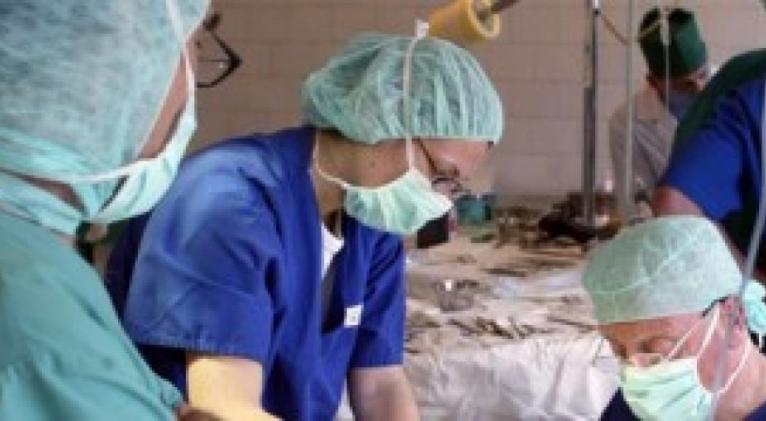Ebola: To Cuba, a crisis; to U.S., a military campaign
especiales

How’s this for a juxtaposition on how nations respond to a global health catastrophe. Check out these two headlines from yesterday’s news:
‘Cuba sends doctors to Ebola areas’
‘U.S. to deploy 3,000 troops as Ebola crisis worsens’
Reading these stories, which ran in, respectively, BBC News and Reuters, one learns that the Cuban government, which runs a small financially hobbled island nation of 11 million people, with a national budget of $50 billion, Gross Domestic Product of $121 billion and per capita GDP of just over $10,000, is dispatching 165 medical personnel to Africa to regions where there are Ebola outbreaks, while the United States, the world’s wealthiest nation, with a population of close to 320 million, a national budget of $3.77 trillion, GDP of $17 trillion, and per capita GDP of over $53,000, is sending troops — 3,000 of them — to “fight” the Ebola epidemic.
 Okay, I understand that these troops are supposedly going to be “overseeing” construction of treatment centers, but let’s get serious. With an epidemic raging through Africa, where some of the poorest nations in the world are located, what is needed right now are not new structures.
Okay, I understand that these troops are supposedly going to be “overseeing” construction of treatment centers, but let’s get serious. With an epidemic raging through Africa, where some of the poorest nations in the world are located, what is needed right now are not new structures.
Tent facilities would be fine for treating people in this kind of a crisis. What is needed is medical personnel. The important line in the Reuters article about the U.S. “aid” plan is that the U.S. troops will
…”establish a military control center for coordination, U.S. officials told reporters.
“The goal here is to search American expertise, including our military, logistics and command and control expertise, to try and control this outbreak at its source in west Africa,” Lisa Monaco, Obama’s White House counter-terrorism adviser, told MSNBC television on Tuesday ahead of the announcement.
Cuba apparently does not feel that it needs to establish a military control center to dispatch its doctors and nurses, nor does it feel that “military, logistics and command and control expertise” are what is needed.
Anyone who thinks this dispatching of U.S. military personnel to Africa is about combating a plague is living in a fantasy world. This is about projecting U.S. military power further into Africa, which has already been a goal of the Obama administration, anxious to prevent China from gaining control over African mineral resources, and to control them for U.S. exploitation.
Ebola, to the U.S., is both an opportunity to gain a bigger foothold in Africa, and a danger, in terms of the disease spreading to the U.S.
Cuba, whose population does not include many tourists, and which is not a destination for many African visitors, either, is sending its medical personnel to Africa not to gain control of Africa’s resources, or to help it establish trade relations with Africa. It has no interest or hope of becoming a major player in the global contest for influence the way the U.S., China or Germany might.
It is sending its medical personnel because they are needed, much as it did almost immediately following the earthquake in Haiti, where the U.S. also responded not with medical aid but with troops.
(The U.S. Navy was dispatched, after considerable delay, and when U.S. forces finally arrived, they found some 300 Cuban doctors and nurses who had already managed to reopen the undamaged portion of a Port-au-Prince Hospital and to set up tent hospitals, before the first U.S. doctor even set foot in Haiti.)
This latest international crisis, which promises to worsen as the Ebola virus spreads further in Africa and, inevitably, moves to other continents, highlights the twisted nature of the United States, which increasingly sees all international issues through a military lens, and every crisis as requiring a military response.
The kindest way to look at this would be to say that the U.S. medical “system,” if it can even be called anything so organized, is so badly funded and so based upon the profit motive, that it is incapable of dispatching hundreds of skilled doctors to Africa to help fight the ravages of a plague like Ebola.
 People in the U.S. are seriously underserved by primary care physicians, the very doctors who are needed when it comes to combating the spread of disease.
People in the U.S. are seriously underserved by primary care physicians, the very doctors who are needed when it comes to combating the spread of disease.
Instead, we in the U.S. have all kinds of high-priced specialists in everything from dermatology and liposuction to cancer specialists who help us combat the diseases caused by our increasingly toxic environment and our chemical-laced foods.
Cuba, on the other hand, despite the nation’s poverty (the result, primarily, of over a half century embargo enforced by the U.S. ever since a leftist rebel movement led by Fidel Castro ousted the colonial government of Fulgencio Batista), has a first-rate medical system composed mostly of those very primary care physicians now needed so badly in Africa.
Let’s not kid ourselves either. There will surely be some military medical personnel among these dispatched soldiers but the U.S. is not sending 3,000 troops to Africa as an act of charity.
It’s safe to say that once those non-medical troops get their “command and control” center established in Africa they will stay there.
Ebola, to the Pentagon and the U.S. State Department, is not a crisis, it is an opportunity, just as the earthquake in Haiti was an opportunity, not a crisis, and, I might add, just as Hurricane Katrina was an opportunity, not a crisis — an opportunity to level much of black New Orleans and to remake the city as a white, middle-class town.













Add new comment